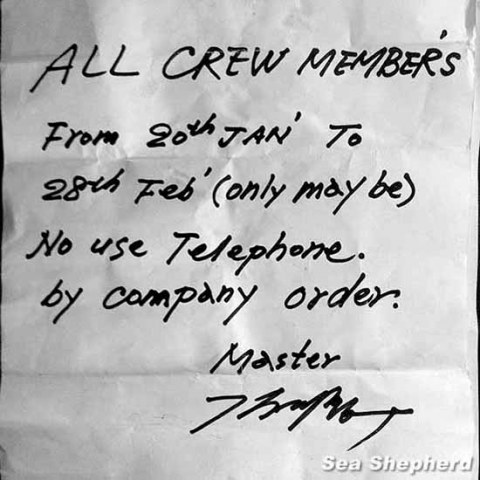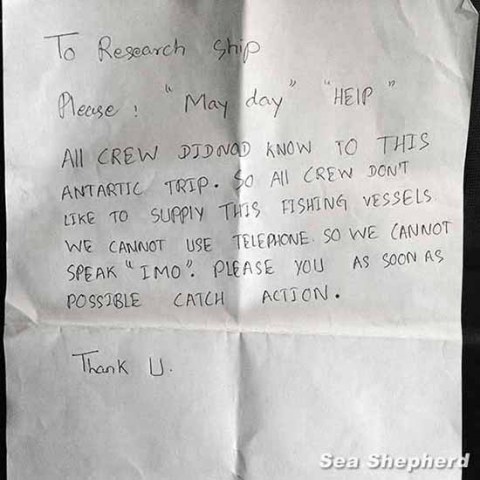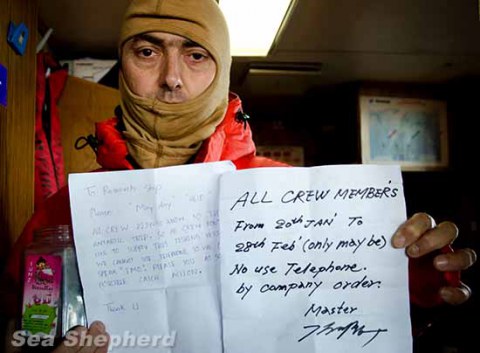Notes thrown by crew from the South Korean owned Panama registered tanker, Sun Laurel, used for refueling the Japanese whaling fleet, indicate at least some of the crew were taken to Antarctica without their consent or foreknowledge and have been denied means of communication with their families and the International Maritime Organisation about violations of their labour rights.
Related: Sea Shepherd: Whaling factory ship rams Korean fuel tanker and 3 activist ships | Whaling Fleet committed multiple breaches of international law says Sea Shepherd Director Bob Brown
Sea Shepherd in their campaign to stop all whaling in the Southern Ocean whale sanctuary this year have endeavoured to non-violently block attempts to refuel the Nisshin Maru, the Japanese whaling factory vessel, the 3 whaling harpoon boats, and the Japanese Government security vessel, the Shonan Maru. This culminated in the Nisshin Maru repeatedly ramming the Sea Shepherd ships Sam Simon, Steve Irwin and Bob Barker in attempting to come alongside the Sun Laurel in the ice laden seas. Most damage was sustained to the Bob Barker with damage to the helideck, antennas and radar, disabling engine room power for a time and causing the ship to take on water. In the process the 8,000-ton Nisshin Maru also rammed the Sun Laurel damaging safety equipment.
Paul Watson aboard the Steve Irwin observed the collisions described the damage to the Sun Lauel as "sustaining significant damage to the davit on their primary lifeboat and the crane used to launch the secondary liferafts, rendering both inoperable and useless in an emergency situation. This means that on their thirty-day voyage back to South Korea, they will have no lifesaving equipment in the event of an abandon-ship situation."
During the Nisshin Maru ramming of the Bob Barker and the Sun Laurel, one of the Filipino crew members tossed a bottle with a message to Sea Shepherd crew on the Bob Barker. The note said "To Research ship. Please: 'May Day' 'Help' All crew did not know to this Antarctic trip. So all crew don't like to supply this fishing vessels. We cannot use telephone so we cannot speak to IMO. Please you as soon as possible catch action. Thank U."
Enclosed was another note, an order from the Master of the Sun Laurel saying: "All Crew members. From 20th Jan to 28th Feb (only may be). No Use Telephone. by company order."
It seems the crew of the Sun Laurel are very dissatisfied with being kept in the dark about the tanker's mission, with the prohibition on all outside contact. I am sure they were not impressed with voyaging into the Antarctic pack ice in a vessel not prepared for sea ice conditions. The final straw was the reckless ramming of the Sun Laurel by the Captain of the Nisshin Maru resulting in damage to key emergency safety lifeboats, or equipment to operate them.
Some of the Bob Barker crew threw Sea Shepherd T-shirts on to the Sun Laurel, which were picked up and immediately worn by the Filipino crew members to cheers from the Sea Shepherd crew.
Although battered by being rammed by the Nisshin Maru, the Captain of the Bob Barker Peter Hammarstedt radioed the Captain of the Sun Laurel with an offer to give them a liferaft to replace the one that the Nisshin Maru had crushed. The tanker captain replied that he could make do, but appreciated the offer.
The Sun Laurel headed north a few hours later escorted by the Sam Simon. The Japanese Institute for Cetecean Research shortly asfter announced that the refueling operation had been suspended. The Nisshin Maru continues to steam east and west in the whale sanctuary flanked by the Bob Barker and Steve Irwin. Conditions for whaling are coming to a close. With the tanker sailing north away from the fleet, the Nisshin Maru may need to limit it's remaining time in Antarctic waters and refuel in Indonesia on the journey back to Japan.
Both Australia and New Zealand have made it clear whaling vessels would be unwelcome. Indeed, it is likely any whaling vessel calling into an Australian port may be impounded with a court injunction served about undertaking illegal activities inder Australian law.
Paul Watson from Sea Shepherd comments about the treatment of the Sun Laurel crew:
"The officers of the ship seem to have little regard for their safety as well, and we saw several members of the crew the nearly get hit in the head with the swinging hook and block on the crane. None of them were equipped with helmets. They were mostly a good bunch of young men caught in the middle of an issue that took them into a situation they were not prepared for.
"The message from the crew is an indication that the Captain, Owners, and Manning Agents of the crew for the MT Sun Laurel are in direct violation of the Maritime Labour Convention (MLC, 200). The MLC convention, established by the International Labour Organisation (ILO), is a UN body that sets out seafarers' rights to decent conditions of work. It has been designed to become a global instrument of the international regulatory regime for quality shipping, complementing the key Conventions of the International Maritime Organization (IMO). We are reporting this to the Maritime Authorities in Panama regarding the violation of the MLC Convention. This will be our 2nd report- the first one was about the oil pollution incident."
Paul Watson warns that Sea Shepherd will remain in the Southern Ocean until the whalers leave or the season ends. They are equally prepared to return next December to close down Japan's illegal commercial whaling operation.
Australian Environment Minister lambasts Japanese Whaling
The Australian Government refuses to intervene directly in the conflict in the Southern Ocean by sending an official Government ship - in the past it has sent a Customs vessel to observe and document Japan's whaling activities and to act as an intermediary between activists and whalers.
Australian Environment Minister Tony Burke said the collisions would be investigated by the Australian Maritime Saftey Authority as they ocurred within Australia's Antarctic search and rescue zone. "the Maritime Safety Authority's going through the investigations on this because it's within our search and rescue zone so AMSA will continue to work through the claims and counter-claims, but the starting point of all of this is still that we don't believe a whaling fleet should have been there in the first place." he told ABC News Breakfast.
He called the presence of the whaling fleet as flagrant violation of the principle of no commercial whaling, and the claims of use of heavy oil in Antarctic waters as a flagrant breech of Antarctic rules. "So you've got safety at sea issues, you've got the Antarctic rules and obviously you've also got the first principle which has brought them there at all which is that they should not be whaling. This is not a scientific process, its commercial whaling and our position is immovable on that." he said.
Injunctions against Sea Shepherd in the US, against Japanese whaling in Australia
The Japanese Institute for Cetecean Research was able to get an injunction issued against Sea Shepherd in the US legal jurisdiction on 17 December 2012. It is a very unusual injunction issued without any formal hearings and a chance for Sea Shepherd to rebutte arguments. The U.S. Ninth Circuit Court of Appeals issued an Injunction Order enjoining Sea Shepherd (US), and Paul Watson from physically attacking the Japanese research vessels or any person on them and from navigating in a manner that is likely to endanger the safe navigation at sea of any such vessel. The Injunction Order also prohibits them from approaching any vessel engaged by the Institute of Cetacean Research (ICR) or Kyodo Senpaku (KS) any closer than 500 yards (about 457 meters) when the research vessels are navigating on the open sea.
However this year the campaign against the Japanese whaling fleet has been handed over to and conducted by Sea Shepherd Australia, a seperate entity, with the campaign being based in the Australian legal jurisdiction where whaling has been found to be illegal since 2008. It would be difficult to see how a US Injunction could be legally enforced on Netherlands and Australian flagged vessels operating out of waters claimed by Australia (but not enforced as all territorial claims in Antarctica are suspended as per the Antarctic Treaty), and an internationally recognised whale sanctuary. However Australian international legal expert Donald Rothwell says the legal dimension is now getting very complicated for Sea Shepherd.
According to Scott West, an investigations operative for Sea Shepherd, the injunction applies only to Sea Shepherd Conservation Society U.S. and its founder, Paul Watson. Paul Watson has relinquished all official positions regarding the Japanese whaling campaign. Mr West explained that the four anti-whaling vessels are operated by Sea Shepherd Australia, a seperate entity, and are flying the Australian and Netherlands flags. "All of these entities have picked up the mission," West said. "Sea Shepherd U.S. is complying with, albeit ridiculous, the injunction. ... We're not going to be in violation of federal law." he said.
Sea Shepherd filed an appeal at a hearing before the US Supreme Court on February 12. Charles Moore, the attorney representing Sea Shepherd, said at a National Press Club briefing that the San Francisco-based 9th Circuit's three-sentence injunction surprised the group because it was issued without warning or a chance to argue in front of the judges and without being requested by Japan's Institute for Cetacean Research. The court issued the preliminary injunction sua sponte, or "of its own accord."
"It is our belief that The Ninth Circuit Court incorrectly issued the injunction without any party filing a motion asking for such an order and without issuing a written opinion explaining why it issued the injunction," said lead counsel for Sea Shepherd U.S., Charles Moure.
"This irregular action provided absolutely no opportunity to brief the legal issues and put forth arguments against the injunction," he stated. "It also ignored a well-reasoned ruling in Sea Shepherd's favor by a District court in February of last year and did not require the ICR to post bond to secure its preliminary injunction, which is standard and generally required under the law when any party obtains an injunction. Sea Shepherd is seeking relief with regard to the injunction while awaiting the Ninth Circuit's opinion," he concluded.
Natural Resources Defense Council practicing attorney Robert Kennedy Jr., described the injunction as "very, very dubious and strange and unique. I've never seen a species of injunction like this before in my 30 years as a practicing attorney and litigator," said Kennedy.
The Institute for Cetecean Research has indicating in it's most recent media release on February 20 it is filing a motion for Contempt against Sea Shepherd in the US over the recent collisions and obstruction of it's refueling operations.
Sea Shepherd Australia have mockingly said they would maintain the distance specified in the US injunction and US law if Japan also respected an equivalent distance from any whales and undertook to respect the Australian court injunction on whaling in the Southern Ocean whale Sanctuary. And so the legal manouervering goes on. All the while the US Government is sitting back refusing to use it's diplomatic muscle to resolve the conflict with the Japanese Government even though it takes a public stance opposing whaling. A whaling Industry shown to be corrupt, and the beneficiaries of substantial Japanese Government support through subsidies and even receiving payments donated for tsunami relief.
Case proceeding in International Court of Justice
The Australian Government is proceeding with a long running case - Whaling in the Antarctic (Australia v. Japan) - before the International Court of Justice about the international legality of Japan's whaling operation which is likely to commence formal hearings and arguments later this year.
As a result of incidents in the last week, Sea Shepherd Australia have now forwarded Complaints to the International Maritime Organisation on a fuel leak from the Sun Laurel below 60 degrees south, a potentially serious breach of the Antarctic teaty, and the denial of labor human rights to the crew on the Sun Laurel. The ramming of three Sea Shepherd ships and the Panama registered tanker Sun Laurel by the Nisshin Maru is currently being investigated by the Australian Maritime Safety Authority (AMSA).
Sources
- Paul Watson, special observer on board the Steve Irwin, Sea Shepherd Australia, 21 February 2013 - Our New Friends on the Whaling Fleet Tanker Sun Laurel
- Federal Minister for the Environment, Tony Burke MP, 21 February 2013 - Interview with Michael Rowland and Karina Carvalho, ABC News Breakfast
- Laura Petersen, via Sea Shepherd Australia, 12 February 2013 - OCEANS: Sea Shepherd takes fight against Japanese whalers to Supreme Court
- Sea Shepherd Australia, 13 February 2013 - Sea Shepherd Takes Battle Against ICR to U.S. Supreme Court
- All Images courtesy of and Copyright Sea Shepherd Australia/Glenn Lockitch




Comments
Japanese people need to know so they can act
Has any of this information been given to the Japanese people? This is where all the facts and the campaign should be taking place. The people need to know so they can act.